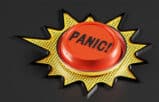Lawyers, it turns out, are not so special. They have just as much difficulty writing and speaking well in their native tongue as the next person. Poor grammar. Jargon. Weird syntax. The ever-popular use of 10 words when one will do. You have your own pet peeves—we certainly have ours—but how can we get past them? Today we begin a new regular feature called “Get to the Point,” with clear communication in mind. First up, Steve Taylor takes on cliches.
“At the End of the Day,” You Need to “Step Up to the Plate” and “Think Outside the Box”
One thing’s for sure: When you’ve been there and done that, you shouldn’t go there because, if you do, you’ll push the envelope and then—even if you’ve hit the ground running—you’ll head down that slippery slope because it’s a no-win situation—and this advice isn’t rocket science or brain surgery.
If you cringed while reading that long sentence, good for you. It means you clearly consider most of that language to be the verbal equivalent of fingernails scratching across a chalkboard.
But, as grating as they are, clichés are everywhere. And every profession is guilty of spawning its own overused jargon. In politics, the cliché of the year has to be “double-down” … although “pivot,” which was heavily bandied about during the 2008 presidential election, continues to stick around. Sports, however, is probably the worst. The world would be a better place if we never heard another athlete telling a pre-game interviewer he plans to give it “100 percent” or, worse, the mathematically impossible “110 percent.”
The legal profession is just as guilty. Lawyers want to offer “value-added service” because they see the “paradigm shift” and are “results-driven” and “client-focused.” What else are they supposed to be focused on, their spiffy, brand-new, custom-leather briefcases? Also, why must we always hear about “best practices”? Because they’re so much better than just-okay practices? And may we never hear another managing partner speak of his firm’s “national platform” or say his partnership is hiring more lawyers but doesn’t “grow for growth’s sake.” (Just once, wouldn’t it be refreshing to hear a law firm leader say, “You know, we just added a bunch of attorneys because we wanted to be bigger than our competitor. What the heck.”)
We all probably hear—and, yes, also use—overworked expressions every day. That’s a shame because the English language is so rich and diverse. There’s no need to shortchange it with tired, stale expressions that have lost their meaning, or never had much to begin with, or are just so ugly-to-the-eyes-and-ears that they should be strangled and buried under the black dirt of the backyard. Yet we still fall victim to the convenience of clichés, in our speech and our writing.
Watch Your Writing, Please
It’s one thing to use buzzwords in our speech—that’s bad enough—but there’s absolutely no excuse for employing them in our written communications. Clichés poison our prose. They turn the minds of readers—whether our readers are clients or colleagues, judges or juries—into mush and make the writer look lazy and amateurish. Banish them from your RFPs, briefs and internal memos and you’ll immediately improve your writing.
Here’s an idea to help you more easily kill clichés: Do what Robert Shuftan, managing partner of Edwards Wildman Palmer, did. He posted a chart in his office—it’s titled “Words Not to Use”—to put the spotlight on expressions he can’t stand, won’t use and doesn’t want to hear.
He got the idea when he was visiting his daughter’s college and saw that a political science professor had posted a list of hackneyed expressions on his door. Shuftan jotted them down on the back of an envelope and brought them back to his law firm, where the staff put them into a grid and on display as a list of words to avoid. “These are the words that too many people rely upon in lazy thinking rather than trying to talk about the issues they want to address,” Shuftan says.
So what are Shuftan’s pet-peeve terms? It probably comes as no surprise (oops, that phrase is overworked as well) that “out of the box,” “synergy,” “fast track” and “win-win” made the chart. So how about “out of the loop” and “total quality”? They’re both there, too. In all, 27 expressions are on his list.
Let It Be Known
Here’s another Shuftan idea to try: Put your marketing consultants, PR people and other service providers on watch. That is, he tells them that if they use canned jargon-riddled language instead of clear and creative ways to communicate what his firm is all about, he won’t give them his business.
You’d be surprised just how much other people truly detest—either consciously or subconsciously—overused expressions. But let’s take as an example U.S. Northern Illinois District Judge Milton Shadur, whose disdain for clichés is very conscious. After decades of reading drivel in various forms, the 80-plus-year-old judge routinely strikes briefs whenever he comes across hackneyed, unnecessary verbiage, sending them back with a note that essentially tells the offending attorney, “Get your writing right.”
So the next time you catch yourself writing that something is “incumbent upon” or “fraught with peril” or “within the purview of,” strike the phrase and start again, even if you think you are “eminently qualified” to use such language.
In short, avoid clichés like the plague. If you do, you’ll realize that it doesn’t get any better than this. It’s a win-win. And that’s the bottom line.
Steven T. Taylor is an award-winning journalist living in Portland, OR, who has written about the legal profession for nearly 20 years. He’s also a college professor who teaches non-fiction writing.
















